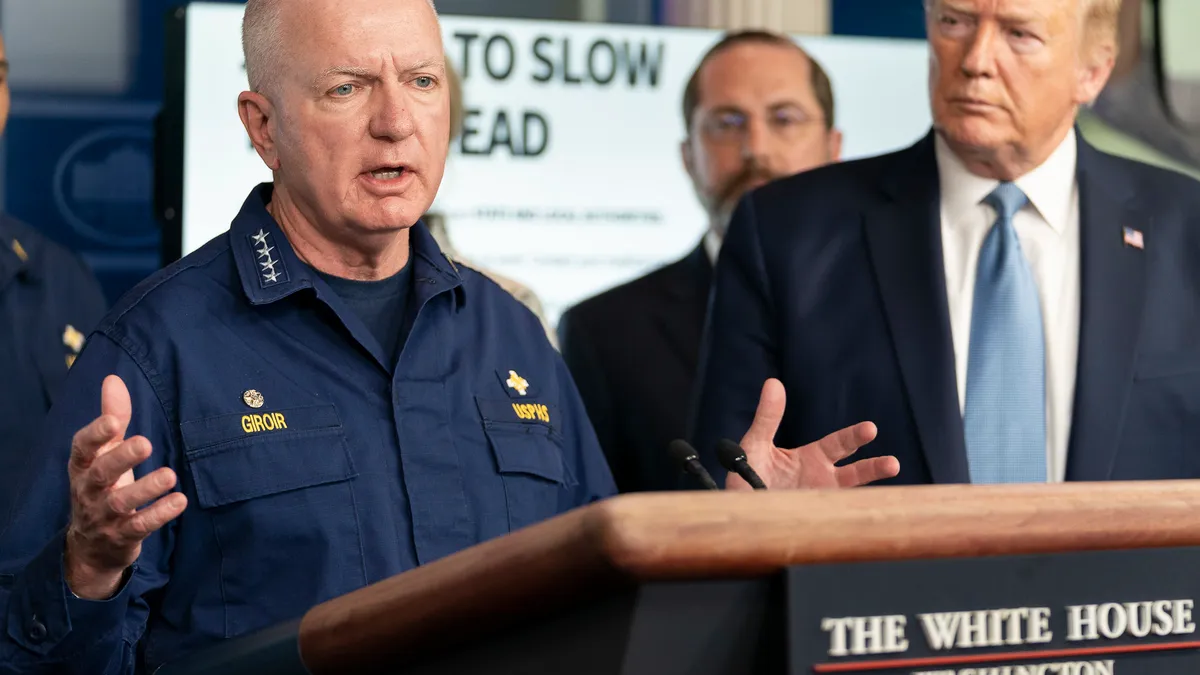Dive Brief:
- HHS Assistant Secretary for Health and White House coronavirus testing czar Brett Giroir on Monday directed the FDA to review emergency use authorization requests for COVID-19 laboratory developed tests "in a timely manner," effectively reversing an FDA decision last month to no longer accept voluntary EUA applications for LDTs.
- If FDA is unable to conduct LDT EUA reviews within 14 days, the National Cancer Institute will assist. While the FDA does not have regulatory jurisdiction to require premarket review of LDTs, Giroir said the action will ensure that university labs can secure voluntary EUAs. "Without an EUA, although the tests can be used, [they] cannot receive liability protection [under] the PREP Act," he said on a media call.
- An FDA spokesperson would not comment, but the agency may be effectively defying Giroir's instructions. FDA Monday updated its FAQ page on SARS-CoV-2 testing clearly stating that it is "declining to review EUA requests for LDTs at this time." The American Clinical Laboratory Association said it believes FDA should continue to allow labs to voluntarily submit EUAs for agency review and authorization.
Dive Insight:
HHS in August announced FDA would no longer require premarket review for LDTs but labs could still voluntarily seek emergency use authorization. Then, FDA's Tim Stenzel, director of the Office of In Vitro Diagnostics and Radiological Health, said early last month the agency would not review EUAs for COVID-19 LDTs to "make the best use" of agency resources.
Now, Giroir is mandating FDA to review LDT EUA applications using authority delegated to him by HHS Secretary Alex Azar.
"We recognize the FDA has a huge workload," Giroir said. "That's why we're trying to provide additional resources. I don't think anybody can question the scientific integrity of the National Cancer Institute."
However, Dennis Gucciardo, partner at law firm Morgan Lewis, noted a number of legal questions still to be answered.
Because NCI is part of NIH, not part of FDA, under the current declaration the regulatory agency "would still have to oversee and approve any LDT EUA applications reviewed by NCI, which would not necessarily reduce the regulatory burden on FDA," Gucciardo said.
Kyle Faget, an attorney at law firm Foley & Lardner, contends it's "hard to imagine that FDA will be able to complete its EUA review of the backlog of LDT tests within 14 days" or that the regulatory agency is "in favor of NCI stepping in to regulate in the LDT space." Having the two agencies on seemingly different pages is not ideal during a public health crisis like the coronavirus pandemic, Faget added.
The Public Health and Emergency Preparedness (PREP) Act provides immunity “from suit and liability under federal and state law" for LDTs that receive FDA premarket review or authorization. Giroir on Monday credited Sen. Amy Klobuchar, D-Minn., for raising concerns about the lack of liability protections for university LDTs that since early October have been unable to secure EUAs.
"What we're speaking about here is really about whether universities, primarily, will be given the same liability protection as major corporate developers and manufacturers, and we want that to be the case," Giroir said.
ACLA, whose members include LabCorp and Quest Diagnostics, said FDA's decision to no longer review EUAs for coronavirus lab-developed tests was "confusing" in light of the fact that "many of the tests that have been granted EUAs for COVID-19 testing are innovative, high-throughput LDTs that have reduced reliance on supplies and been integral to expanding testing capacity." Julie Khani, ACLA's president, made the case that "these are exactly the kinds of tests that FDA has stated it wants to prioritize."
Michael Mina, professor of epidemiology at Harvard's T. H. Chan School of Public Health, applauded the latest action.
"This is a major win for ensuring that laboratories have the [liability] coverage they need to be able to keep pushing forward for testing. Without PREP Act coverage, many laboratories that could offer testing find themselves in very vulnerable positions," Mina said.
However, while having an EUA for an LDT satisfies certain criteria for PREP Act liability immunity, Gucciardo said other criteria needs to be considered. For example, HHS' declaration of immunity from liability, published March 17 and amended on April 15, states that liability immunity is only available for those recommended activities involving "covered countermeasures" and labs that don’t have federal contracts may find it difficult to satisfy the criteria, according to Gucciardo.
"Courts of law will be the ultimate arbiter and thus a lab won't know whether it is being afforded PREP Act liability immunity until after it has been sued," Gucciardo warned.
For now, the Association for Molecular Pathology asked for clarity on the latest move.
Mary Steele Williams, AMP's executive director, noted the updated version of the FDA's FAQ document does not reflect the new policy changes.
While Giroir made it clear that all COVID-19 LDTs are able to be used for testing without EUAs from FDA, he said lab developed tests are still regulated by the federal government through CMS' Clinical Laboratory Improvement Amendments program.
AMP recommends that HHS leverage the existing CLIA program for additional support for LDTs. "CLIA already regulates laboratories that perform testing on patient specimens in order to ensure accurate and reliable test results. Because of this, CLIA is best positioned to provide oversight for [laboratory developed testing procedures] for COVID-19 and other laboratory tests," said Williams.
However, Harvard's Mina believes the decision to continue authorizing LDTs under the EUA program is a much-needed development. While he acknowledged the bar is "not particularly high" for EUAs, Mina said "given the potential money incentive that exists right now in testing, the last thing we want is fully deregulated testing."














